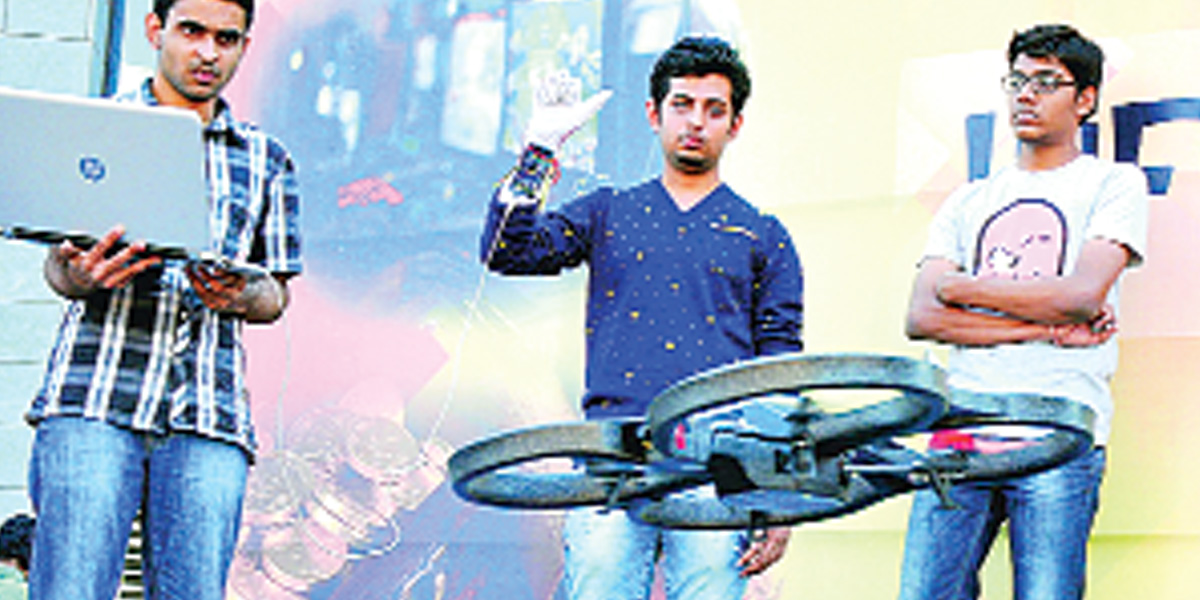Live
- Former Minister Avanti Srinivas Resigns from YSRCP, Citing Personal Reasons
- 3-judge Special Bench of SC to hear today pleas against Places of Worship Act
- MP CM to lay foundation stone for Rs 1,700 crore Sondwa irrigation project in Alirajpur
- Garena Free Fire MAX Redeem Codes for December 12, 2024 – Get Free Rewards
- Vinay Kumar Yaragani’s Strategies to Reduce Unpaid Transactions in E-Commerce
- Telangana: Thieves Rob Three Shops in Armor Town, Nizamabad
- Actor flayed for attack on journalists
- On completion of one year, Bhajan Lal govt in Rajasthan to hand over 15,000 job letters
- Survey process at a brisk pace
- Direct flight between Delhi, Rajahmundry from today
Just In

Indian Institute of Technology Hyderabad IITH witnessed another year of growth and exemplary achievements in 2018 The past year has once again proved that the Institute is at the forefront of academia, research and development, industry collaboration, innovation and entrepreneurship
Hyderabad: Indian Institute of Technology Hyderabad (IIT-H) witnessed another year of growth and exemplary achievements in 2018. The past year has once again proved that the Institute is at the forefront of academia, research and development, industry collaboration, innovation and entrepreneurship.
Among the key highlights of the year was the participation of Honourable President of India Ram Nath Kovind as the chief guest in the Seventh Convocation of IIT Hyderabad in which 566 students (435 boys & 131 girls) graduated.
Speaking about the achievements of the Institute in 2018 and the plans for the next year, Prof. U B Desai, Director, IIT Hyderabad, said, “IITH made great strides in 2018 and looks forward to even stronger growth in 2019. The main thrust will be in Artificial Intelligence, 5G, Cyber Physical Systems, Batteries and other cutting-edge areas. Some exciting plans will be revealed as the New Year progresses. Research and academic innovations will always be at the forefront.”
Some snapshots of the achievements in 2018 include:
Launch of First-of-its-kind Incubator in Chip Design Sector: FabCI is supported by the Ministry of Electronics and Information Technology (MEITY) and is in partnership with Cadence Design Systems, Inc. It is based in the IIT Hyderabad campus for fabless IC start-ups in India. Its aim is to incubate world-class semiconductor start-ups that can help accelerate change in the Indian landscape in semiconductor design. The primary motivation for this unique incubator programme is to provide a one-stop solution for start-ups focusing in the area of chip design. The vision of this incubator is to create an ecosystem wherein the incubatees are not only provided with the relevant infrastructure, hardware and software but also are mentored through the path of success by mentors who are pioneers in this field.
A first of its kind MoU was signed with National Institute of Advanced Industrial Science and Technology (AIST), Japan, in the area of Artificial Intelligence during the Honourable Prime Minister Narendra Modi’s visit to Japan in October 2018.
Cutting Edge Research & Development: The year also witnessed IIT Hyderabad researchers undertake results in diverse areas across the spectrum that benefitted the country and economy in many ways.
High End Lithium batteries at affordable prices: PuREnergy, a start-up that’s part of IIT Hyderabad Technology Incubation Centre (Sponsored by Govt. of India), taken the plunge to design and implement innovative solar energy solutions to industrial, commercial and residential users. While the current models of Lithium batteries in the market are expensive, PuREnergy’s aim is to make them available at economical prices due to their strong design capabilities and in-house product development. Founded in 2016 by Nishanth Dongari, Assistant Professor, Department of Mechanical and Aerospace Engineering, IIT Hyderabad, PuREnergy has designed and assembled Lithium batteries with wide applications in fields from agriculture to aerospace.
Research under Prof. Soumya Jana and Prof. C S Sastry: Researchers are developing computer programs that are capable of detecting heart diseases from ECG data obtained at the patient’s site, rather than at a healthcare facility, and of communicating the information to the doctor/specialist at a remote location. An algorithm developed by them, also extracts meaningful data from a combination of ECG and BP data of the patient, much like a real cardiologist would do, when assessing a patient’s heart health.
Research under Prof. Shiv Govind Singh: Researchers are developing a smartphone-based sensor to detect adulteration in milk. As a first step, they have developed a detector system to measure the acidity of milk through the design of an indicator paper that changes colour according to the acidity of the milk. They have also developed algorithms that can be incorporated on to a mobile phone to accurately detect the colour change. The Researchers have developed a prototype smartphone-based algorithm, in which, the colours of the sensor strips after dipping in milk are captured using the camera of the phone, and the data is transformed into pH (acidity) ranges. They have used three machine-learning algorithms and compared their detection efficiencies in classifying the colour of the indicator strips. On testing with milk spiked with various combinations of contaminants, they found near-perfect classification with an accuracy of 99.71%.
Entrepreneurial Environment: IIT Hyderabad-incubated start-ups have developed healthcare technologies to save babies lives and help bed-bound individuals. HEAMAC Healthcare Pvt. Ltd, which aims to solving unidentified pressing needs in neonatal and maternal care, has developed a product to help infants suffering from physiological jaundice. Kvayat Medical developed a product on faecal management system to assist bed-bound individuals and enabling them to lead life with dignity.
Tinkerer's lab: The Institute launched a Tinkerer's laboratory (TL) for students to develop ‘Do-It-Yourself’ (DIY) projects driven by their own ideas. The laboratory comes equipped with a wide variety of scientific instruments and will help students explore their interests beyond the boundaries of curriculum. It is fully managed and run by student volunteers who have a special knack for designing, developing, prototyping using materials and techniques.

© 2024 Hyderabad Media House Limited/The Hans India. All rights reserved. Powered by hocalwire.com







